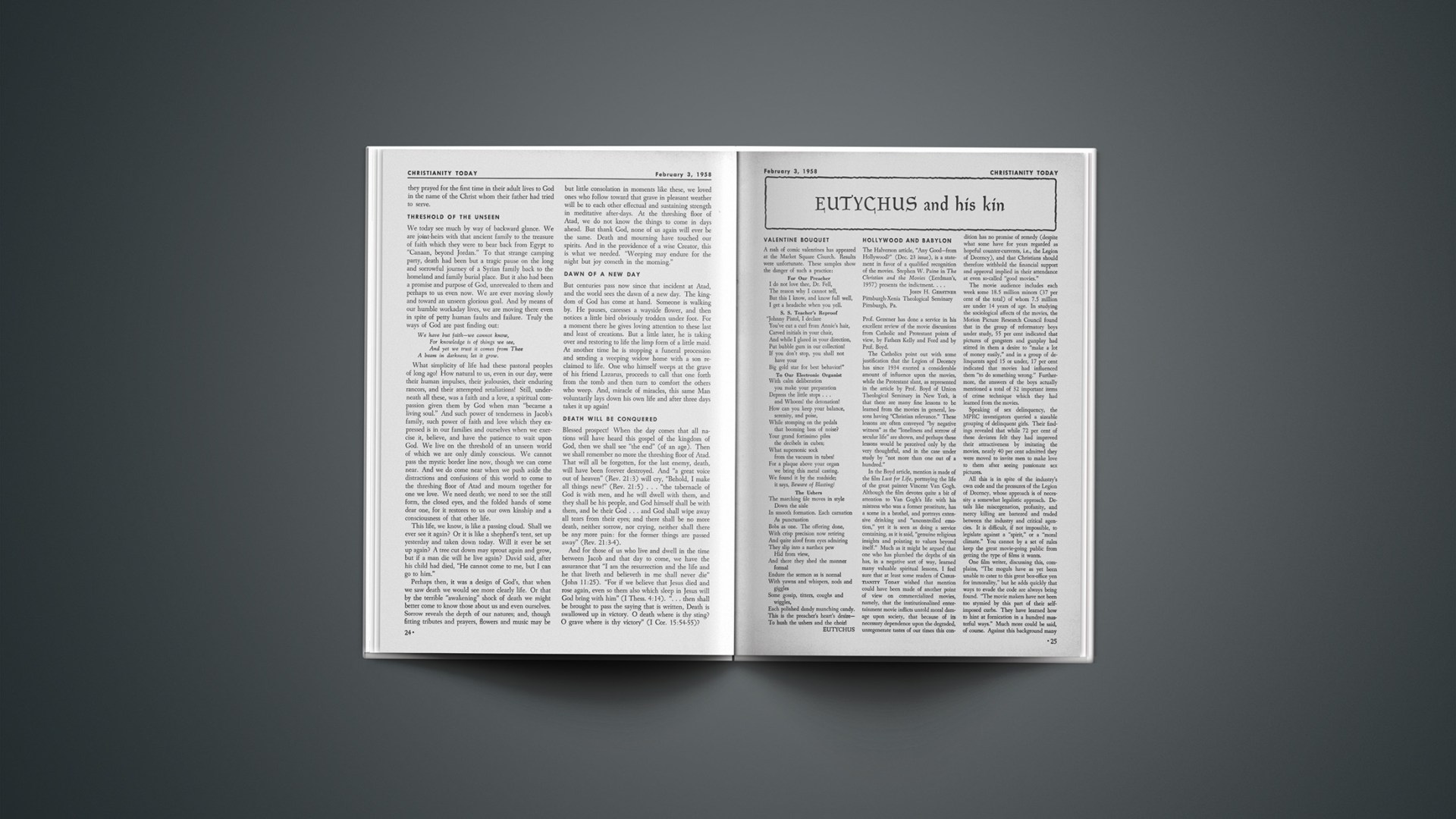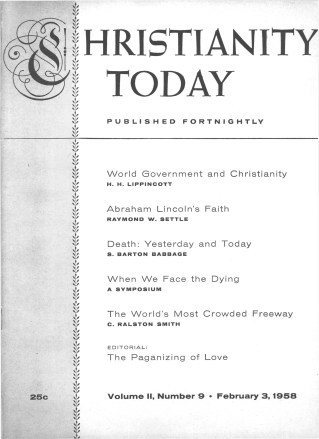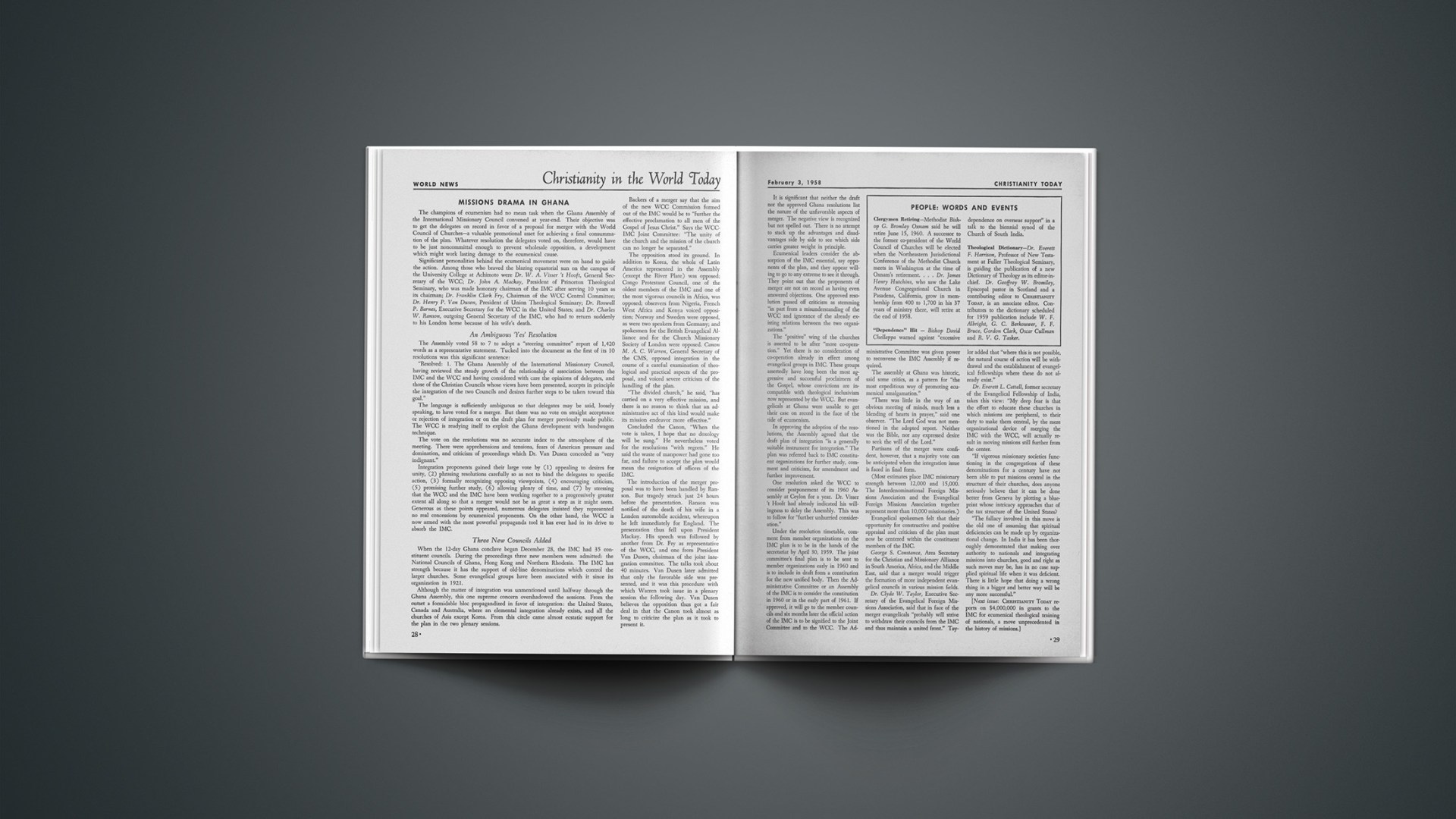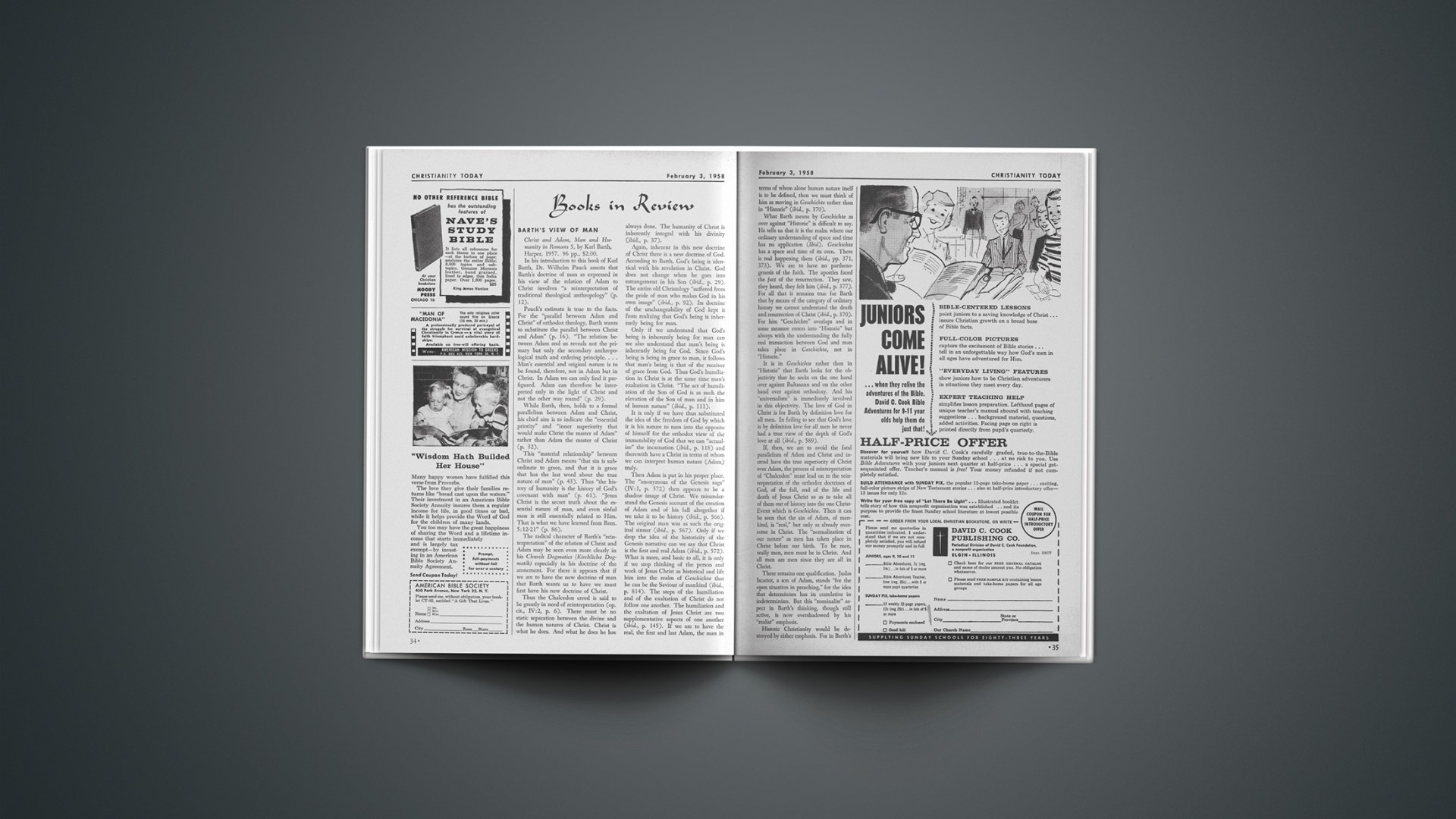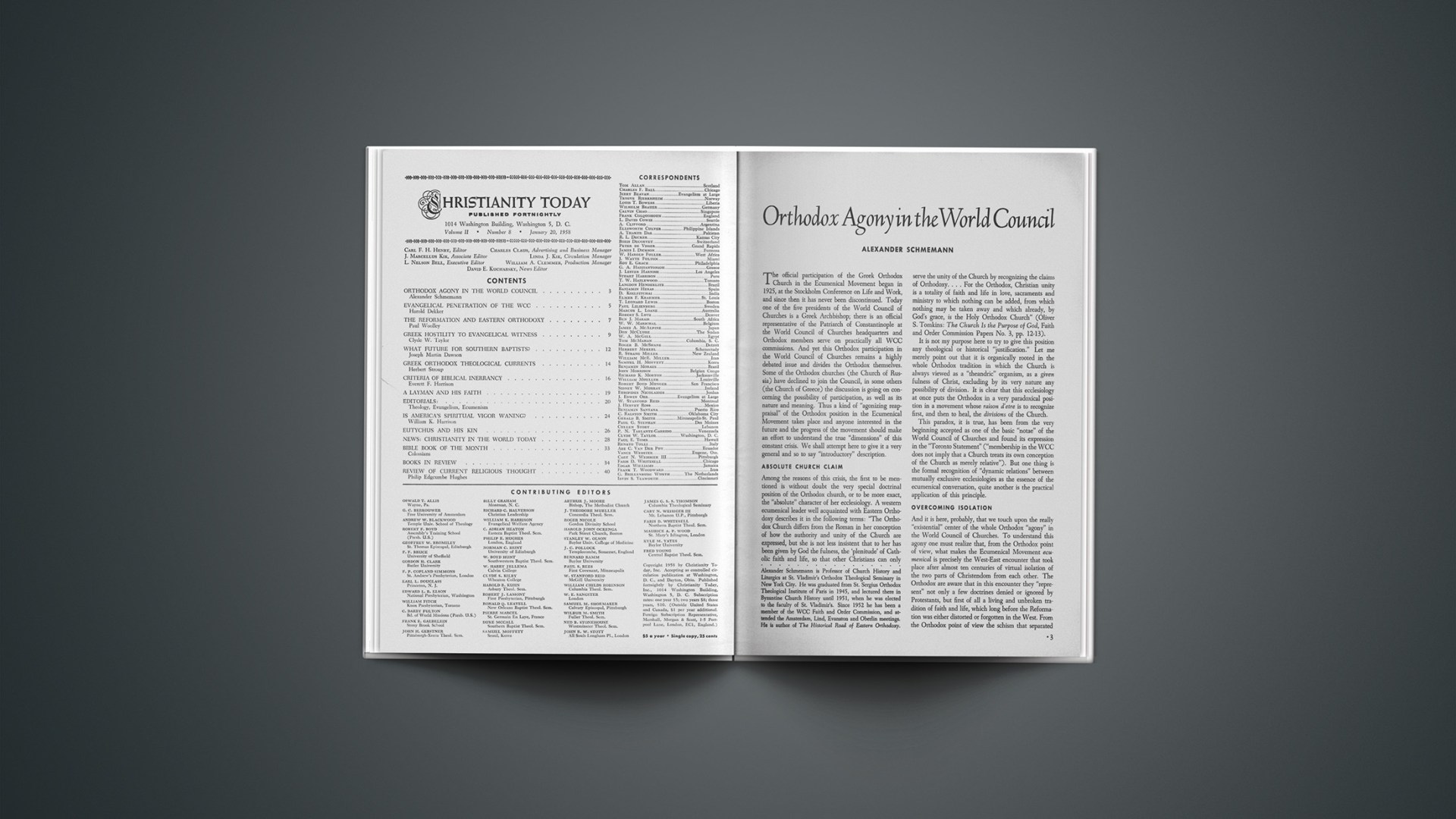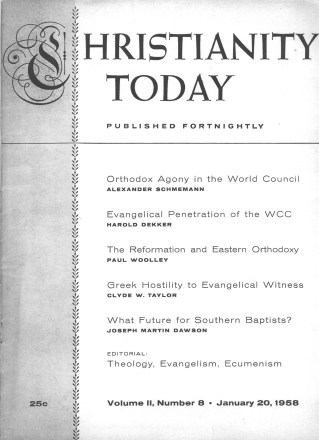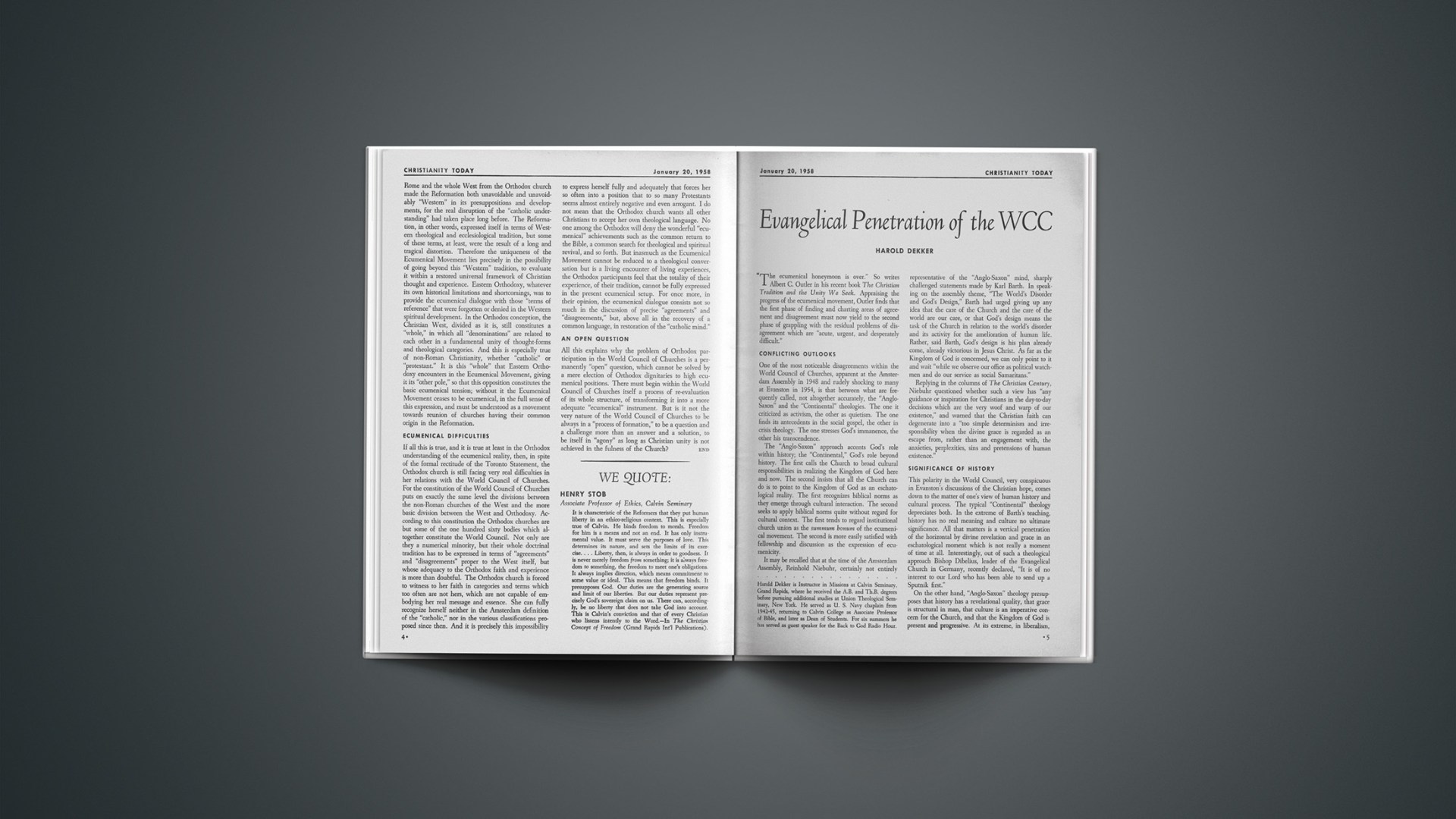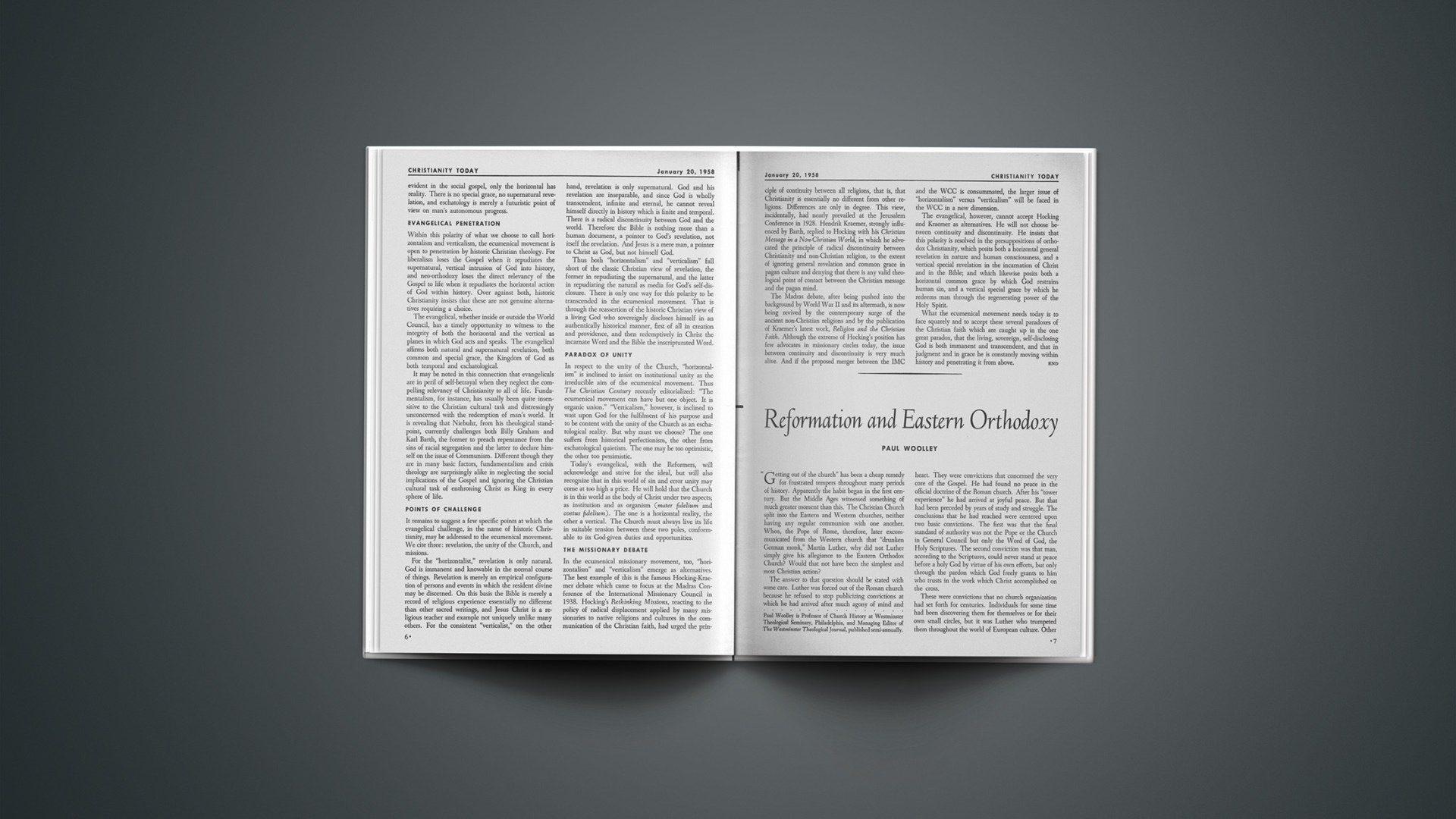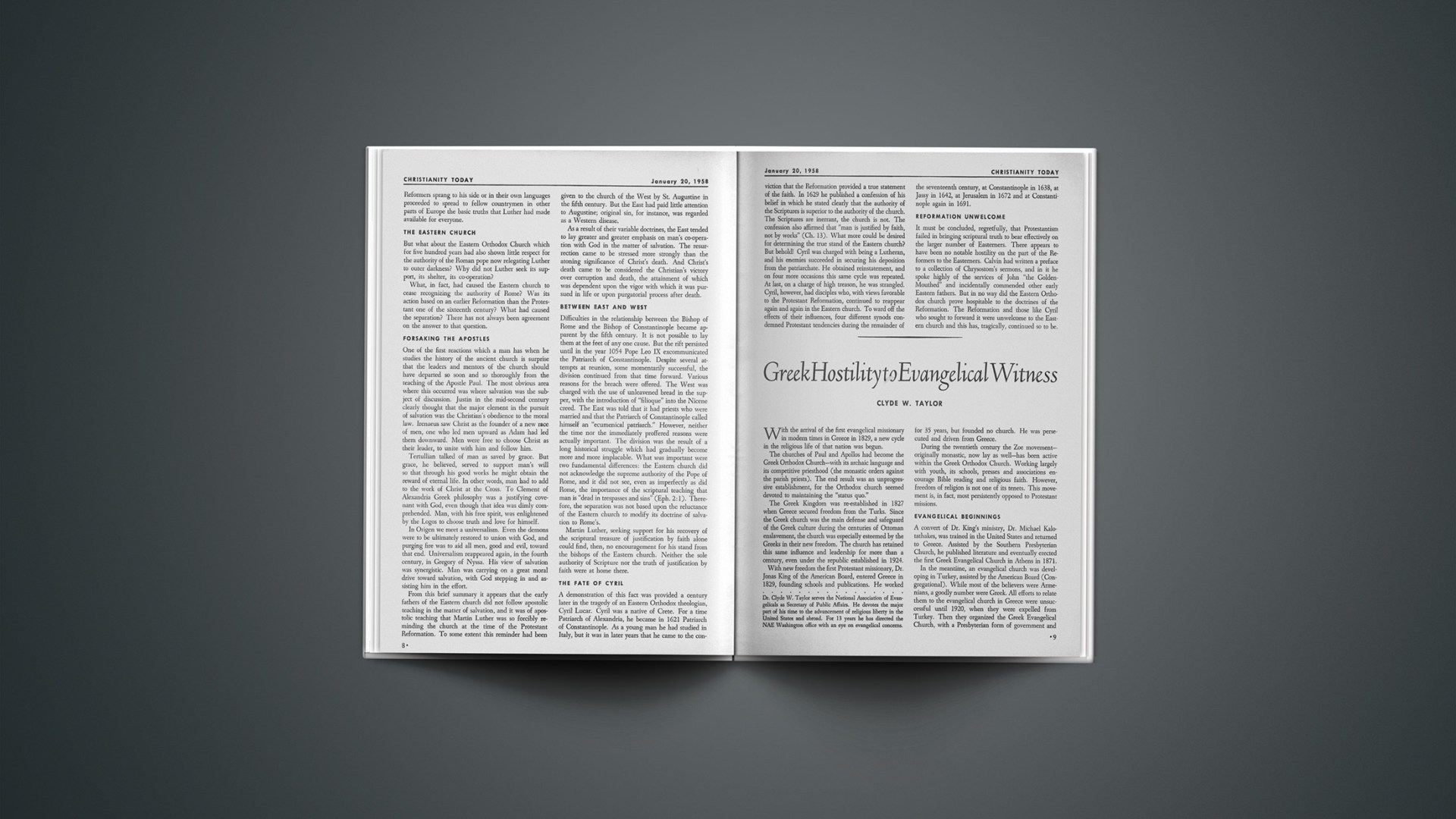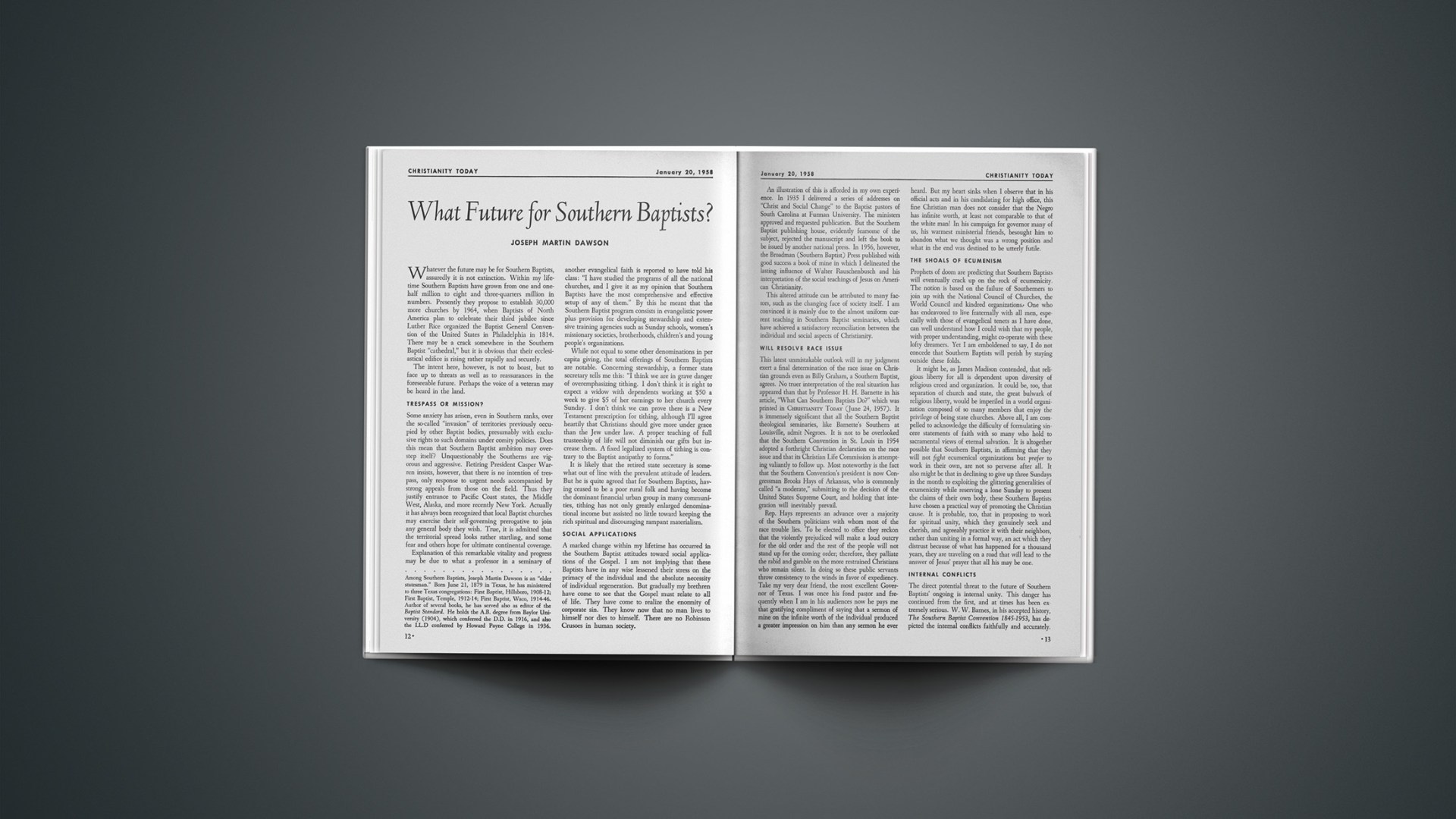VALENTINE BOUQUET
A rash of comic valentines has appeared at the Market Square Church. Results were unfortunate. These samples show the danger of such a practice:
For Our Preacher
I do not love thee, Dr. Fell,
The reason why I cannot tell,
But this I know, and know full well,
I get a headache when you yell.
S. S. Teacher’s Reproof
“Johnny Pistol, I declare
You’ve cut a curl from Annie’s hair,
Carved initials in your chair,
And while I glared in your direction,
Put bubble gum in our collection!
If you don’t stop, you shall not have your
Big gold star for best behavior!”
To Our Electronic Organist
With calm deliberation
you make your preparation
Depress the little stops …
and Whoom! the detonation!
How can you keep your balance,
serenity, and poise,
While stomping on the pedals
that booming bass of noise?
Your grand fortissimo piles
the decibels in cubes;
What supersonic sock
from the vacuum in tubes!
For a plaque above your organ
we bring this metal casting.
We found it by the roadside;
it says, Beware of Blasting!
The Ushers
The marching file moves in style
Down the aisle
In smooth formation. Each carnation
As punctuation
Bobs as one. The offering done,
With crisp precision now retiring
And quite aloof from eyes admiring
They slip into a narthex pew
Hid from view,
And there they shed the manner formal
Endure the sermon as is normal
With yawns and whispers, nods and giggles
Some gossip, titters, coughs and wiggles,
Each polished dandy munching candy.
This is the preacher’s heart’s desire—
To hush the ushers and the choir!
EUTYCHUS
HOLLYWOOD AND BABYLON
The Halverson article, “Any Good—from Hollywood?” (Dec. 23 issue), is a statement in favor of a qualified recognition of the movies. Stephen W. Paine in The Christian and the Movies (Eerdman’s, 1957) presents the indictment.…
Pittsburgh-Xenia Theological Seminary
Pittsburgh, Pa.
Prof. Gerstner has done a service in his excellent review of the movie discussions from Catholic and Protestant points of view, by Fathers Kelly and Ford and by Prof. Boyd.
The Catholics point out with some justification that the Legion of Decency has since 1934 exerted a considerable amount of influence upon the movies, while the Protestant slant, as represented in the article by Prof. Boyd of Union Theological Seminary in New York, is that there are many fine lessons to be learned from the movies in general, lessons having “Christian relevance.” These lessons are often conveyed “by negative witness” as the “loneliness and sorrow of secular life” are shown, and perhaps these lessons would be perceived only by the very thoughtful, and in the case under study by “not more than one out of a hundred.”
In the Boyd article, mention is made of the film Lust for Life, portraying the life of the great painter Vincent Van Gogh. Although the film devotes quite a bit of attention to Van Gogh’s life with his mistress who was a former prostitute, has a scene in a brothel, and portrays extensive drinking and “uncontrolled emotion,” yet it is seen as doing a service containing, as it is said, “genuine religious insights and pointing to values beyond itself.” Much as it might be argued that one who has plumbed the depths of sin has, in a negative sort of way, learned many valuable spiritual lessons, I feel sure that at least some readers of CHRISTIANITY TODAY wished that mention could have been made of another point of view on commercialized movies, namely, that the institutionalized entertainment movie inflicts untold moral damage upon society, that because of its necessary dependence upon the degraded, unregenerate tastes of our times this condition has no promise of remedy (despite what some have for years regarded as hopeful counter-currents, i.e., the Legion of Decency), and that Christians should therefore withhold the financial support and approval implied in their attendance at even so-called “good movies.”
The movie audience includes each week some 18.5 million minors (37 per cent of the total) of whom 7.5 million are under 14 years of age. In studying the sociological affects of the movies, the Motion Picture Research Council found that in the group of reformatory boys under study, 55 per cent indicated that pictures of gangsters and gunplay had stirred in them a desire to “make a lot of money easily,” and in a group of delinquents aged 15 or under, 17 per cent indicated that movies had influenced them “to do something wrong.” Furthermore, the answers of the boys actually mentioned a total of 32 important items of crime technique which they had learned from the movies.
Speaking of sex delinquency, the MPRC investigators queried a sizeable grouping of delinquent girls. Their findings revealed that while 72 per cent of these deviates felt they had improved their attractiveness by imitating the movies, nearly 40 per cent admitted they were moved to invite men to make love to them after seeing passionate sex pictures.
All this is in spite of the industry’s own code and the pressures of the Legion of Decency, whose approach is of necessity a somewhat legalistic approach. Details like miscegenation, profanity, and mercy killing are bartered and traded between the industry and critical agencies. It is difficult, if not impossible, to legislate against a “spirit,” or a “moral climate.” You cannot by a set of rules keep the great movie-going public from getting the type of films it wants.
One film writer, discussing this, complains, “The moguls have as yet been unable to cater to this great box-office yen for immorality,” but he adds quickly that ways to evade the code are always being found. “The movie makers have not been too stymied by this part of their self-imposed curbs. They have learned how to hint at fornication in a hundred masterful ways.” Much more could be said, of course. Against this background many Christians feel that the commands of scripture enjoining separation from the world-spirit, and warning against being unequally yoked with unbelievers, would seem to call for a policy of abstinence from the commercialized entertainment movie.
President
Houghton College
Houghton, N. Y.
It is good to read an article which does not start out to make a whipping boy of Hollywood, although I thought I detected a concession that movies are not per se evil, which to me was condescending.
Hollywood has much to recommend it to the intelligent man. Whatever else might be said about it, there is, at least, a concerted effort to adjust its material to certain moral standards, which at the minimum would reflect the basic laws of the Ten Commandments, and which sometimes soars considerably beyond this.
One has only to compare the product of other branches of the entertainment world with what appears on the screen to see this in the concrete. A current example would be the extremely popular picture Peyton Place. Is there any need to recall the fuss that was made about the novel from which this picture was derived?
Another fairly obvious example would be Heaven Knows, Mr. Allison, which, of course, could have been vulgar beyond description. Consider also the quality of some of the material on the so-called legitimate stage, as well as the contents of many of the foreign films imported into this country, and you will readily get the idea that while all is not perfect here, nor as lofty as some earnest souls might want it to be, it is still not Babylon by any means.…
Motion Picture Assn. of America
Production Code Administration
Hollywood, Calif.
• The Hollywood road runs nearer Babylon than Sinai. Time Magazine’s cinema editor remarks: “There is still too much meaningless blood and lust in Peyton Place” (Jan. 6 issue). Yet the camera and cinema are not intrinsically evil. And every sincere effort to bring them within the orbit of Christ’s lordship has value. The Production Code may stop short, but a code is a code.—ED.
THE CHURCH IN RUSSIA
The first article by Henlee H. Barnette (Dec. 23 issue) relates a story, gotten at third or fourth hand, about a Christian who answered the communist counterblast with the word, “Christ is risen.” I first read that story about 20 years ago. Then it was in a small village on Easter Day, and the Commissar had gathered the peasants together to indoctrinate them with the communist ideology. After he had finished he asked if anyone wanted to say anything. One man got up and said, Yes. The Commissar said, Make it short. He stepped to the platform and said, “Christ is risen.” His fellow-peasants answered with one voice, “He is risen, indeed.” That has the ring of probability and truthfulness. That little incident has grown until now it is 40,000 that answer with one voice. Which is a very improbable happening indeed.
California Christian Citizens Assn.
Los Angeles, Calif.
• Prof. Barnette of the Southern Baptist Theological Seminary faculty, author of the article “The Church in Soviet Russia,” comments: “Could it not possibly have happened in 1940 on a larger scale?… Note that I cite the famous theologian Emil Brunner as my source for the story (cf. The Great Invitation, pp. 74–75). I do not believe that Dr. Brunner embellished the story enough to seriously mar its truth.”—ED.
Your … article … is the line which the Reds want us to accept concerning the church in Russia.…
CARL MCINTIRE, President
Intl. Council of Christian Churches
Collingswood, N. J.
EVOLUTION AND UNBELIEF
J. H. Ward is right (“Unbelief Today,” Jan. 6 issue). Mussolini, Bismarck, Hitler, Stalin all used the same naturalistic-evolutionistic base to build on. But we, stupidly, do not see it.… When a magazine with the might, power, wealth and influence of science behind it—such as the Scientific Monthly—can give ten pages against any temptation to even consider supernaturalism, as its November issue did, then the Church of Christ had better wake up.…
Anti-Evolution Compendium
Henniker, N. H.
VIRGIN BIRTH AFTERTHOUGHT
I have been rather amazed at the rejection of the Virgin Birth of Jesus by certain of your correspondents but even more amazed at the reasoning by which they arrive at their conclusions.
Having practised law for 19 years before becoming a priest, I am inclined to approach these problems from a legal position. I was taught and conducted my trial work as a lawyer on the rule of evidence that if you could prove a witness falsified his testimony in one respect, you have a right to tell the jury that he is not to be believed in any respect. What these writers are saying is that St. Luke and St. Matthew are liars with regard to their testimony on the Virgin Birth of our Lord. How then, can they believe their testimony in other respects? How can they believe “The Sermon on the Mount” or bring themselves to follow it to the best of their ability as a teaching of our Lord?
… You cannot impeach one witness with the silence of another. The fact that St. Mark, St. John and St. Paul make no specific reference to the Virgin Birth as such would never be accepted as evidence to make St. Matthew and St. Luke out as liars.… How ridiculous can one get?
St. James Episcopal Church
Titusville, Pa.
I am a retired Methodist minister of the Peninsula Annual Conference.… I have the profoundest respect for an intellectual and scholarly interpretation of the Holy Scriptures, but when it becomes so rationalistic as to rule out the supernatural in the miracles of the New Testament, of which the Virgin Birth is historically factual and of signal import, I am constrained to raise my voice in protest.
The letters by Vernon T. Smith and John A. Hawkins are astutely worded in the vernacular of a modern liberalism in theology which would question not only the truth of the Virgin Birth, but any other of the miracles of the New Testament, and ruling out any possibility of a supernatural act of divinity. To my thinking, such rationalism is perilously destructive.…
Salisbury, Md.
I have the deepest respect and fondest admiration for Dr. Douglass, for, having seen the error of his earlier thinking, he changed his views on a very important doctrine.… Two of the comments on Dr. Douglass’ article were by Presbyterians (U.S.A.) … expressing contempt for a cardinal doctrine of the Church to which they belong. In their ordination vows they were to have sincerely received and adopted the Confession of Faith of their Church, which contains the system of doctrine taught in the Holy Scriptures—the doctrine of the virgin birth not excepted. They were to have vowed also that the Scriptures were their infallible rule of faith and practice.… I’m sure this position is not generally held by all Presbyterians, for which we are thankful, but still remain disturbed because those who err are not corrected or disciplined.…
United Presbyterian Church
Reinbeck, Iowa
Matthew 1:11 gives Jechonias (Coniah) as one of Joseph’s ancestors. Read Jeremiah 22:24–30, especially the 29th and 30th verses.… If Joseph were the father of Jesus, then Jesus is not the Christ the Son of David.…
Bradenton, Fla.
COUNTERBLAST TO WRATH
The enclosed sermon … is in a measure a counterblast to your “Jonathan Edwards’ Still Angry God” (Jan. 6 issue) … Read particularly the marked passages … (“Jonathan Edwards believed in a … kind of god … quite foreign to the nature of Jesus.… The god he portrayed was as horrific in his spiritual features as the masked witch doctor of some primitive tribe is horrific in physical appearance. My God is a God of love.…”) Please return the sermon after you have glanced through it; it is still unfinished as you may realize.…
Carman United Church
Sardis, B. C.
I will have to take issue with you and Jonathan Edwards.… If we live in a dispensation of Grace, then it is one of love and not of anger.… The whole world of humanity was predestined to be saved.… It is doubtful if there are many hell-scared Christians.…
Charleston, W. Va.
The God pictured in the editorial is certainly Jonathan Edwards’ God and not the Christian God and Father of our Lord Jesus Christ.…
Pentwater Methodist Church
Pentwater, Mich.
… A misapprehension of God’s present economy of grace.… God the Father has “committed all judgment unto the Son.” The Judge of all men throughout this dispensation of grace is their Saviour. This accounts for the long suffering of God in a day of exceeding sinfulness and extreme lawlessness.… Sir Robert Anderson has aptly stated in Silence of God,” … all judicial and punitive action against human sin is in abeyance—deferred until the day of grace is over and the day of judgment dawns … a truth that will be sought for in vain in the standard theology of Christendom.”
Wheaton, Ill.
Certainly God gets angry. He even hates sinners because of their sin. Are you suggesting, however, that this wrath of God is separate from and equal to his love?… that “God is wrath” or “God is hate” in the … same way as one says “God is love”? Is it not a God of love who consigns the lost to hell?…
Martin Luther referred to wrath as the “alien” nature of God, and love as the “essential” or “proper” nature of God. He was even able to call wrath one of the enemies which Christ “satisfied” by conquering in the atonement.
Bethany Evangelical Lutheran Church
East Grand Forks, Minn.
I want to commend your editorial on Jonathan Edwards.… It’s surely needed now.…
Pasadena, Calif.
I was very much pleased by the editorial “Jonathan Edwards’ Still Angry God.” The primary issue in the Church today is not the Deity of Jesus Christ, his bodily Resurrection, or his Virgin Birth, but the Pauline interpretation of the Cross. If, as evangelicals contend, Paul received this doctrine from the risen Lord (Gal. 1:11, 12), then there can be no thought of compromise. Christianity is sterile without the “expiatory and propitiatory significance” of Christ’s death; the zeal of Paul in persecuting the early Church proves this thesis. When it becomes popular in the visible Church to reject the Pauline doctrine of the Atonement as pagan, then we may well wonder at the profound offense the Cross of Christ brings to the world.…
Harvard University
Cambridge, Mass.
MORNING MAIL
Thank you for a periodical that shys away from the stilted intellectualism of some others we could name and the ultra conservatives at the other end of the road.…
First Baptist Church
Savannah, Mo.
Tremendous value lies in the fact that … you have done what fundamentalists have fought tooth and nail—introduced self-criticism. I believe that such a willingness to judge ourselves is not only basic to our making an impact on our contemporaries but it is indispensable for presenting ourselves worthily before the Lord.…
Gordon College
Beverly Farms, Mass.

